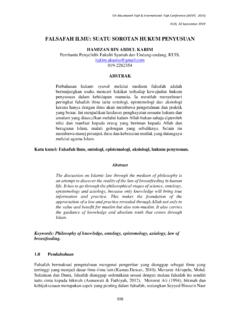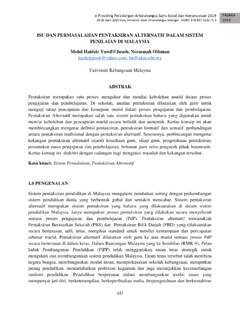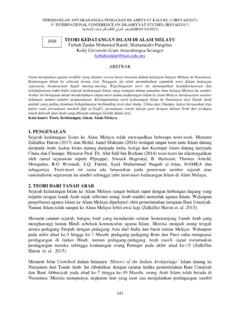Transcription of SHARIAH GOVERNANCE FRAMEWORK: THE ROLES OF …
1 Proceeding of the 3rd International Conference on Management & Muamalah 2016 (3rd ICoMM) 31st October - 1st November 2016, 978-967-0850-61-0 375 SHARIAH GOVERNANCE framework : THE ROLES OF SHARIAH REVIEW AND SHARIAH AUDITING Nor Fadilah Bahari Department of Accounting and Finance, Faculty of Management and Muamalah International islamic University College, Malaysia Nuzul Akhtar Baharudin Department of Accounting and Finance, Faculty of Management and Muamalah International islamic University College, Malaysia ABSTRACT The growth of the islamic finance industry around the world is due to the unique features of islamic Financial institutions(IFIs) that emphasize on the fairness and justice in their operations. Al Quran and As-sunnah be the main rules to be followed. The IFIs are responsible to ensure they comply with the SHARIAH principles in its products, instruments, operations, practices, management, etc.
2 As for that reason, SHARIAH GOVERNANCE is another component that is peculiar exclusively to IFIs. Hence this conceptual paper attempts to highlight the ROLES of SHARIAH Review and SHARIAH Auditing and thus discuss on the issues and challenges related to SHARIAH review and SHARIAH Audit in islamic Financial Institution(IFIs). Key Words: SHARIAH GOVERNANCE , SHARIAH Review , SHARIAH Auditing 1. INTRODUCTION The growth of the islamic finance industry had led to the development of islamic finance products and its GOVERNANCE . Increasing demand on islamic Financial Institutions(IFIs) enforce IFIs to be regulated through a set of standards. In the early operation of the islamic finance in the market, there is no formal entity or special body to supervise the IFIs on the SHARIAH matters or resolve the SHARIAH issues. However started in 1976, the first SHARIAH Supervisory Board (SSB) in IFIs has been set up by Faisal islamic Banks of Egypt and followed by Jordan islamic Bank and Faisal islamic bank of Sudan in 1978.
3 In Mei 1997, Bank Negara Malaysia established the SHARIAH Advisory Council (SAC) on islamic banking and Takaful. The SAC is the highest body for islamic banks, Takaful companies, islamic financial business, islamic development financial business, or any other IFIs which is based on SHARIAH and supervised by Bank Negara Malaysia(Hasan, 2010) and require all the IFIs to fully implement in year 2011. In year 2010, SHARIAH GOVERNANCE framework (SGF) has been introduced to set out the rules, regulations and procedures in the establishment of a SHARIAH committee, the role, and scope of duties of the committee as well as the relationship between the institutional the institutional SHARIAH committee and the SAC of the central bank (Grassa, 2013). The purpose of the establishment of the guideline is to ensure the effective functioning of the islamic financial system and promoting its integrity.
4 It can only be Proceeding of the 3rd International Conference on Management & Muamalah 2016 (3rd ICoMM) 31st October - 1st November 2016, 978-967-0850-61-0 376 sustained if there is a good corporate GOVERNANCE practice by IFIs that comply with the SHARIAH guidance. As defined by IFSB -10 SHARIAH GOVERNANCE is a set of institutional and organisational arragements through which IFIs ensure that there is effective independent oversight of SHARIAH compliance over the issuance of the relevant SHARIAH pronouncements, dissemination and information and an internal SHARIAH compliance review. Therefore SHARIAH Advisory Board was established to oversee and supervise the SHARIAH compliance and being an authority body on ensuring SHARIAH compliance. The establishment of SAC is statutory requirements for all IFIs.
5 A comprehensive SHARIAH GOVERNANCE system depends on the following: i. management and supervision ii. SHARIAH Advisory Board iii. SHARIAH compliance and review iv. transparency and disclosure Harmonise SHARIAH GOVERNANCE rules like their counterpart in corporate GOVERNANCE rules are needed to assure a high level playing field to improve transparency and enhance trust hence safeguard the interest of investors and other stakeholders in IFIs. Ineffective or weak GOVERNANCE has always been the cause of financial failures in financial markets. History of failures can be explained by the failure of few IFIs such as Ihlas Finance in Turkey, islamic Bank of South Africa and islamic Investment Companies of Egypt, the commercial losses of Dubai islamic Bank. An effective function of the SHARIAH GOVERNANCE system able to mitigate the non compliance risk and uphold the reputation of IFIs in the market.
6 Figure 1 shows the milestone of SHARIAH GOVERNANCE in Malaysia started from the establishment of first islamic banking Act 1983 until the year 2012. Figure 1:The SHARIAH GOVERNANCE Milestone Started with the establishment of the first islamic bank in Malaysia Bank Islam Malaysia Berhad, islamic banking Act was set up in the same year to supervise the operation of IFIs. Furthermore, in 1997 SHARIAH Advisory Council has been proposed as the highest authority to ascertain islamic law for the purpose of islamic banking business, Takaful business, islamic finance business or any activities or business which is based on SHARIAH principle. This reflects the uniqueness of IFIs compared to conventional banks. In year 2010, SGF has been introduced and implemented in year 2011 by IFIs. Proceeding of the 3rd International Conference on Management & Muamalah 2016 (3rd ICoMM) 31st October - 1st November 2016, 978-967-0850-61-0 377 The framework shows that a sound and robust SHARIAH GOVERNANCE framework is reflected by effective and responsible board and management, an independent SHARIAH Committee that is both competent and accountable, supported by a strong internal SHARIAH research capacity, and monitored through active SHARIAH review, SHARIAH audit and SHARIAH Risk Management Department.
7 Figure 2 exposed to the current Malaysia s SHARIAH GOVERNANCE framework for IFIs. Figure 2: The Malaysia s SHARIAH Governnace framework An effective practice of good GOVERNANCE requires all those involved to carry out their responsibilities in the best manner possible with the infrastructure support in the form of procedures, processes and oversight mechanisms. For an IFIs, the oversight mechanism is usually done by their SHARIAH department and in Malaysia this is further strengthened by the Central Bank s requirement that all IFIs are required to have a SHARIAH Committee. To date, 27 SAC members had been appointed starting from 1999 until the year 2016. 2. LITERATURE REVIEW ON SHARIAH GOVERNANCE SHARIAH GOVERNANCE is a GOVERNANCE system that ensures all activities and business transactions by IFIs are free from non-allowable elements such as riba, gharar, maisir and other similar attributes.
8 According to IFSB, Standards 10 (2009) SHARIAH GOVERNANCE system refers to the set of institutional and organizational arrangements through which an IIFs ensures that there is effective independent oversight of SHARIAH compliance . Mizushima, (2013) studies on the relationship between SHARIAH GOVERNANCE and corporate GOVERNANCE . Finding disclose that western capitalism purposely to realize social justice and welfare, but neither of which has been its main purpose. On the contrary, the main focus in SHARIAH GOVERNANCE is on SHARIAH compliance, and its function at financial institutions looks passive. For that reason it is important and responsibility of an IFI to establish a sound and robust SHARIAH GOVERNANCE with emphasis on the ROLES of key functionalities in ensuring effective implementation of the SHARIAH GOVERNANCE framework .
9 SHARIAH committee or SHARIAH Board play a vital function to safeguard the IFIs to comply with the SHARIAH ruling and fulfill the philosophy of IFIs in the operation, business and procedure to adhere with SHARIAH requirement. Haji Besar, Abd Sukor, Abdul Muthalib, & Gunawa(2009) discuss the ROLES and responsibilities of SHARIAH Supervisory Board(SSB) in two selected bank which are Bank Islam Malaysia Berhad and Bank Proceeding of the 3rd International Conference on Management & Muamalah 2016 (3rd ICoMM) 31st October - 1st November 2016, 978-967-0850-61-0 378 Muamalat Malaysia berhad. Kasim, Ibrahim, & Sulaiman(2009) examine the expectations and the actual practice of SHARIAH audit function in islamic financial institutions (IFIs) in Malaysia and disclose some issue in SHARIAH auditing interm of framework , the scope, the qualification and the issue of independence.
10 All the four pertinent issues of discussion show that what is actually desired does not coincide with the actual practice. This indicates that the practice of SHARIAH auditing has not seriously taken an impact in IFIs in Malaysia despite it being a crucial monitoring tool for SHARIAH compliance. Furthermore, Hasan (2014) conducted semi-structured interviews with fourteen SHARIAH scholars from different IFIs in three selected countries Dubai, United Kindom and Malaysia. The study shows that there are exist gaps and shortcomings in the existing SHARIAH GOVERNANCE practices of IFIs, particularly the aspects of the general approach to SHARIAH GOVERNANCE , the internal SHARIAH GOVERNANCE framework , the attributes of the SHARIAH board in terms of mechanisms of competence, independence and transparency and confidentiality, operational procedures and SHARIAH board s respondents affirms that regulatory frameworks affect and influence the degree of disclosure and transparency of SHARIAH GOVERNANCE practice in IFIs.









